Roman Consuls Seized Power Through Intimidation, Bribery And Show Business
Ellen Lloyd - AncientPages.com - During the days of the Roman Republic, two consuls were elected. They served one year before they were replaced. If a consul died during his term (not uncommon when consuls were in the forefront of battle) or was removed from office, another would be elected.
Because a consul's imperium extended over Rome, Italy, and the provinces, becoming a Roman consul was a matter of prestige and power.
So, what qualifying criteria were future consuls expected to have in order to seize power? There is a saying that cheating is often an efficient method to get what you want, and in the case of Roman consuls, this was undoubtedly true.
Credit: Adobe Stock - Massimo Todaro
Intimidation, bribery, and show business were all part of a regular agenda for a Roman who wanted to become a consul and part of the Roman government.
Of course, much more was required to gain the position of a consul. He was expected to have tremendous confidence and the solid education necessary to be a great speaker. He must master the art of rhetoric. In other words, his speaking or writing must be persuasive. '
It never hurt to marry into a wealthy family because it was a smart way of quickly getting votes. In ancient Rome, it was common that wealthy and powerful families supported each other through a form of an alliance known as amicitia which can be described as Roman friendship, strongly regulated by ethical norms and social expectations.
Being a showman was a must. The more one could entertain people; the better were the odds of being elected. As Marcus Tullius Cicero once said: "Surround yourself with large numbers of people from every class and rank… Make sure your campaign has plenty of ceremony, brilliance, and entertainment for the people."
Intimidating rivals was very common in Rome. A man who wanted power was expected to use all necessary means to reach his goal. Intimidating could include inciting riots or hiring gladiators to beat up people.
There were also two forms of bribery common during the early days of the Roman Republic. Direct bribery could be used to pay officials with money in return for votes. Another option was indirect bribery based on providing free grain, entertainment, and outdoor banquets.
A good way of becoming more powerful was to become a mob favorite and organize a series of gladiator games the public loved.
Once a man became a Roman consul, he was responsible for war, justice, and finance. He was the highest elected political office of the Roman Republic, and the consulship was considered the highest level of the cursus honorum (an ascending sequence of public offices to which politicians aspired).
Yet, it seems strange that a man who seized power through injustice was later responsible for justice. Fortunately, there were also so-called co-consuls whose job was to ensure no individual could abuse the executive power.
Updated on October 22, 2023
Written by Ellen Lloyd – AncientPages.com
Copyright © AncientPages.com All rights reserved. This material may not be published, broadcast, rewritten or redistributed in whole or part without the express written permission of AncientPages.com
Expand for referencesDr Barbara Levick - The Government of the Roman Empire
All About History Magazine, Issue 9
More From Ancient Pages
-
 St. Elmo’s Fire – Ancient Plasma Phenomenon That Frightened Sailors
Ancient History Facts | Sep 4, 2024
St. Elmo’s Fire – Ancient Plasma Phenomenon That Frightened Sailors
Ancient History Facts | Sep 4, 2024 -
 Golosov Ravine – Mysterious Time-Warping Mist Causing Unexplained Disappearances And The Ancient Shrine Of God Veles
Featured Stories | Jul 3, 2021
Golosov Ravine – Mysterious Time-Warping Mist Causing Unexplained Disappearances And The Ancient Shrine Of God Veles
Featured Stories | Jul 3, 2021 -
 Legend Of Brigadoon: Mythical Village Where Time Stands Still
Featured Stories | Nov 2, 2016
Legend Of Brigadoon: Mythical Village Where Time Stands Still
Featured Stories | Nov 2, 2016 -
 Stone Age Infants Received Care For Nine Hours Per Day From Up To 15 Different Caregivers – Study Informs
Archaeology | Nov 15, 2023
Stone Age Infants Received Care For Nine Hours Per Day From Up To 15 Different Caregivers – Study Informs
Archaeology | Nov 15, 2023 -
 Ominous Black Layer – A Geological Anomaly Or Scientific Evidence Of A Great Ancient Cosmic Catastrophe?
Featured Stories | Jan 29, 2019
Ominous Black Layer – A Geological Anomaly Or Scientific Evidence Of A Great Ancient Cosmic Catastrophe?
Featured Stories | Jan 29, 2019 -
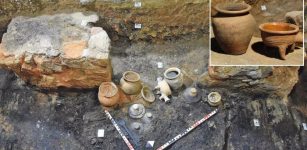 Uniquely Well-Preserved Medieval Kitchen Unearthed North of Moravia
Archaeology | Aug 11, 2022
Uniquely Well-Preserved Medieval Kitchen Unearthed North of Moravia
Archaeology | Aug 11, 2022 -
 New Underwater Discoveries Made Around The Antikythera Shipwreck
Archaeology | Jul 21, 2023
New Underwater Discoveries Made Around The Antikythera Shipwreck
Archaeology | Jul 21, 2023 -
 Charles VI Of France – The King Who Was Made Of Glass
Featured Stories | Jan 22, 2016
Charles VI Of France – The King Who Was Made Of Glass
Featured Stories | Jan 22, 2016 -
 Unique Early Alemannic Chamber Grave Discovered In Gerstetten, Germany
Archaeology | Sep 20, 2024
Unique Early Alemannic Chamber Grave Discovered In Gerstetten, Germany
Archaeology | Sep 20, 2024 -
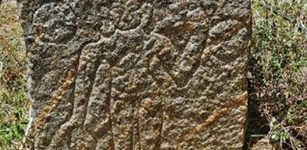 500-Year-Old Vaishnava Saint Sculptures Discovered
Archaeology | Oct 15, 2015
500-Year-Old Vaishnava Saint Sculptures Discovered
Archaeology | Oct 15, 2015 -
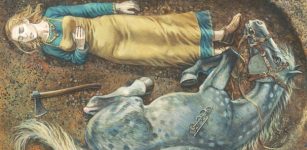 Vikings Cared Deeply For Their Animal Companions – Shared Human And Horse Burials Reveal
Featured Stories | Aug 3, 2023
Vikings Cared Deeply For Their Animal Companions – Shared Human And Horse Burials Reveal
Featured Stories | Aug 3, 2023 -
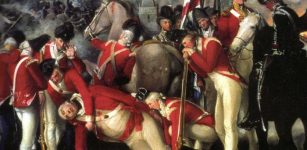 On This Day In History: Irish Rebellion Led By The United Irishmen Against British Rule Begins – On May 24, 1798
News | May 24, 2016
On This Day In History: Irish Rebellion Led By The United Irishmen Against British Rule Begins – On May 24, 1798
News | May 24, 2016 -
 What America’s First Board Game Can Teach Us About The Aspirations Of A Young Nation
Featured Stories | Jun 6, 2024
What America’s First Board Game Can Teach Us About The Aspirations Of A Young Nation
Featured Stories | Jun 6, 2024 -
 On This Day In History: Thor Heyerdahl Sails From Morocco On Papyrus Boat Ra II To Barbados – On May 17, 1970
News | May 17, 2016
On This Day In History: Thor Heyerdahl Sails From Morocco On Papyrus Boat Ra II To Barbados – On May 17, 1970
News | May 17, 2016 -
 Aslaug’s Revenge For The Death Of Ragnar Lodbrok’s Sons Eirik And Agnar
Featured Stories | Dec 10, 2018
Aslaug’s Revenge For The Death Of Ragnar Lodbrok’s Sons Eirik And Agnar
Featured Stories | Dec 10, 2018 -
 Major Underwater Archaeological Find On The Western Coast Of Sicily – Artifacts From The Battle Of The Egadi Islands?
Archaeology | Sep 11, 2023
Major Underwater Archaeological Find On The Western Coast Of Sicily – Artifacts From The Battle Of The Egadi Islands?
Archaeology | Sep 11, 2023 -
 4,500-Year-Old Sumerian Palace Discovered In The Ancient City Of Girsu
Archaeology | Feb 20, 2023
4,500-Year-Old Sumerian Palace Discovered In The Ancient City Of Girsu
Archaeology | Feb 20, 2023 -
 Massive Head Of Hercules Pulled From The Antikythera Shipwreck
Archaeology | Jun 23, 2022
Massive Head Of Hercules Pulled From The Antikythera Shipwreck
Archaeology | Jun 23, 2022 -
 House Of Dragons – Stories And British History That Inspired The Beasts Of Westeros
Featured Stories | Sep 18, 2022
House Of Dragons – Stories And British History That Inspired The Beasts Of Westeros
Featured Stories | Sep 18, 2022 -
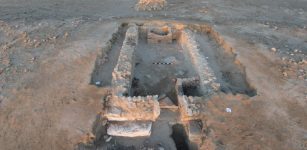 Unusually Arranged Skeletons And Artifacts Found Inside A 1,500-Year-Old Tomb In Berenice Troglodytica, Egypt
News | May 27, 2022
Unusually Arranged Skeletons And Artifacts Found Inside A 1,500-Year-Old Tomb In Berenice Troglodytica, Egypt
News | May 27, 2022

